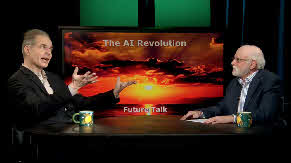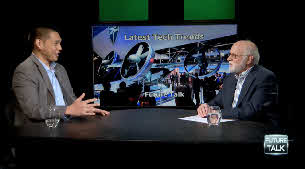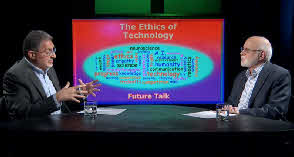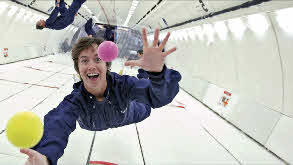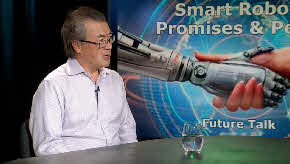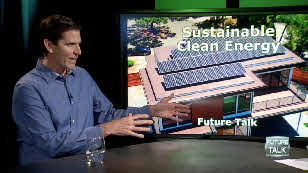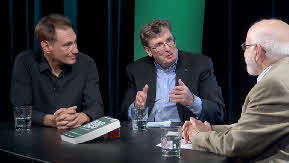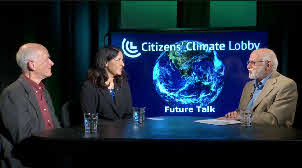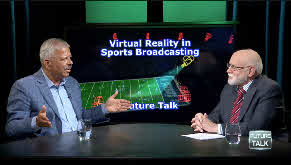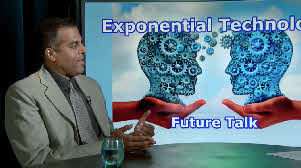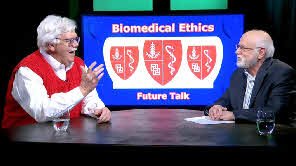
|
Contact us |

Click on an title or picture to see an episode

Artificial intelligence is an extremely powerful technology that can produce enormous benefits but also enormous harm. How can we maximize the benefits while minimizing the harm? Discussing this issue is Steve Omohundro, chief scientist at AIBrain, a leading AI company in Silicon Valley. Steve has been working on AI for over 35 years in numerous tech startups and research labs. A former computer science professor at the University of Illinois, he has a PhD in physics from UC Berkeley and his stated goal is to make sure that AI is only used for humanity's benefit.
The latest trends in consumer technology, and the amazing new electronic devices we’ll have in our homes and offices in the next few years. The guest is Linn Huang, V.P. of Research at International Data Corp., a top market research firm. Linn tracks industry developments and market trends for many types of electronic products, and he tells us what we can expect to see in the near future. He also recently attended the annual Consumer Electronics Show in Las Vegas, one of the biggest shows of its kind in the world, and discusses what he saw there.
The ethical dilemmas created by modern technologies such as artificial intelligence, robotics and social media. Modern technology has become an enormously powerful force that can be used to cause harm just as easily as it can be used to do good. What ethical principles can we apply to the use of technology to make sure it does more good than harm? The guest is Mehran Sahami, Professor of Computer Science at Stanford University and former Senior Research Scientist at Google who is currently involved in designing and teaching courses for undergraduates that explore the relationship between ethics and technology.
What skills, attitudes and character traits will young people need to navigate a technological society very different from the one their parents grew up in? Discussing this question is Marc Prensky, widely known futurist and author in the field of education. Marc is the founder of the Global Future Education Foundation, he’s written seven books on education, he’s an internationally acclaimed speaker who’s lectured in over forty countries, and he’s taught school at every grade level from elementary school to college. He coined the term ''digital native''. He says among other things that students should spend less time memorizing facts and more time doing real world projects that have practical import.
The convergence of robotics and artificial intelligence. What will the smart robots of the future be able to do? And how can we prevent this very powerful technology from being used destructively? Joon Yun, M.D., is an early pioneer in the use of AI for healthcare applications, and also has a long term interest in the merger of AI and robotics. He is president of a healthcare hedge fund, is a trustee of the Salk Institute, and has produced dozens of patents and scientific articles. He’s also donated millions of dollars for prizes and challenge awards to be given those who achieve important advances in longevity research.
Mark Z. Jacobson, Professor of Civil and Environmental Engineering at Stanford University, and director of Stanford’s Atmosphere/Energy Program, discusses his work with sustainable clean energy. As part of his work, he’s developed computer models to study how fossil fuels affect the atmosphere and the weather, which are now used by numerous other researchers in the field. He believes we can achieve all of our energy needs from clean, renewable sources alone such as wind, water and solar power, without depending on fossil fuels at all, and all of his research is focused on achieving that objective.
At a time when more and more workers are being displaced by machines, we discuss the new “People Centered Economy,” which focuses on increasing the value of human workers so their jobs don’t become obsolete. There are two guests. Curt Carlson served for 16 years as President and CEO of SRI International and is also the founder of Practice of Innovation, a consulting company that advises governments and corporations around the world. David Nordfors is the co-founder of Innovation 4 Jobs, a think tank that looks for ways to create new types of jobs and prepare people to fill them, and is the coauthor of a book called The People Centered Economy.
The Citizens Climate Lobby (CCL) is a nonprofit, bipartisan group that seeks to influence national policies on climate change, and currently has a proposed bill on greenhouse gases being considered by Congress. There are two guests from the CCL. David Cain is Outreach Coordinator for the Silicon Valley North Chapter and spends much of his time lobbying Congress on climate change issues. He is a co-founder of a company that develops environmental pollution accounting software. Tasha Reddy is the California State Coordinator for the CCL and has studied climate change in both the Arctic and the Antarctic, and worked on climate issues with NASA and the National Oceanic and Atmospheric Administration.
The guest is Sankar “Jay” Jayaram, a pioneer in the field of virtual reality and Chief Technology Officer of Intel Sports, which is dedicated to applying virtual reality to major athletic events such as Olympic competitions and pro football games. Their products were widely used in the 2018 Winter Olympics in South Korea. Jay has been a leader in virtual reality for over 25 years.
A discussion about technology that’s accelerating at an ever increasing rate of speed, and how it’s affecting us now and is likely to affect us in the future. The guest is Kartik Gada, whose main area of expertise is the economic impact of technological disruption. Kartik is chief financial officer and chief economist of SingularityAIX, a large artificial intelligence company. He also operates an investment banking practice for AI companies, and is a cofounder of a market-outperforming AI hedge fund .
A discussion of recent advances in the biological sciences, and the ethical and legal questions raised by the new technology. The guest is Hank Greely, Director of the Center for Law and the Biosciences at Stanford University. He is also a Professor of Law at Stanford Law School and a Professor of Genetics (by courtesy) at Stanford Medical School and is also is Chair of the California Human Stem Cell Research Advisory Committee.
A discussion of quantum computing, a method of computing that’s still in the early stages of development, but is considered to have great potential for the future. Instead of relying on bits, which can only have a value of one or zero, quantum computers are based on ''qubits,'' which utilize principles of quantum mechanics and can be in several different states at the same time. This enables them to solve certain types of problems much more efficiently than conventional computers. The guest is Matt Johnson, co-founder and CEO of QC Ware, a company that develops algorithms and software for quantum computers.
